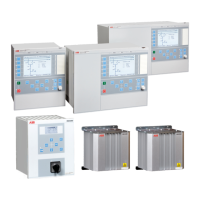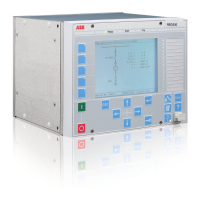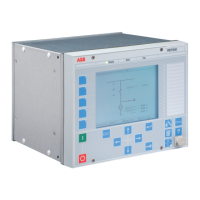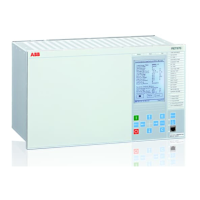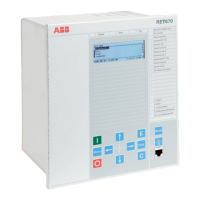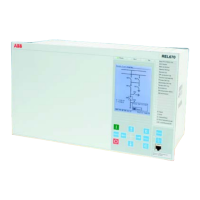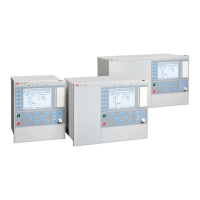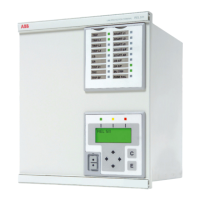Step- up
transformer
Field breaker
Excitation
transformer
I
A
I
B
I
C
I
a
I
b
I
c
V
A
V
a
Pri- side (HV)
Sec- side(LV)
Two alternative
measurement points
for the rotor overload
function
ANSI12000019-2-en.vsd
ANSI12000019 V2 EN-US
Figure 317: Measurement of rotor currents
The selection of current measurement is done by using the parameter
MeasurCurrent
:
• When
MeasurCurrent
= RMS; The maximum true RMS current value from the three-phase input
currents is used as the measured quantity for the rotor overload protection.
•
MeasurCurrent
= DC (default); The calculated rotor winding DC current in primary amperes is
used as the measured quantity for the rotor overload protection. The DC current is calculated
from the connected three-phase input currents, see Figure
317. This DC current calculation is
valid for any type of three phase rectifier bridge (i.e. either diode or thyristor based).
In order to properly calculate the rotor winding DC current the physical location of the used CT is
defined by the parameter
CT_Location
• When
CT_Location
=
LV_winding
(default) is selected, it means that the used CT is located on
the secondary, low-voltage side (LV) of the excitation transformer which directly feeds into
the rectifier bridge, see Figure
317. In that case the rotor winding instantaneous DC current i
DC
is calculated as per the following equation
GUID-8C279C3B-3CDE-47FA-ADD3-1E5CFD4F7536 V2 EN-US (Equation 165)
where i
a
, i
b
and i
c
are instantaneous sampled values of the three-phase currents from LV side of
the excitation transformer. Note that this calculation is done twenty times per power system
cycle. After that the average DC current value I
DC
is calculated over one power system cycle by
using the following formula:
1MRK 502 066-UUS B Section 8
Current protection
591
Technical manual

